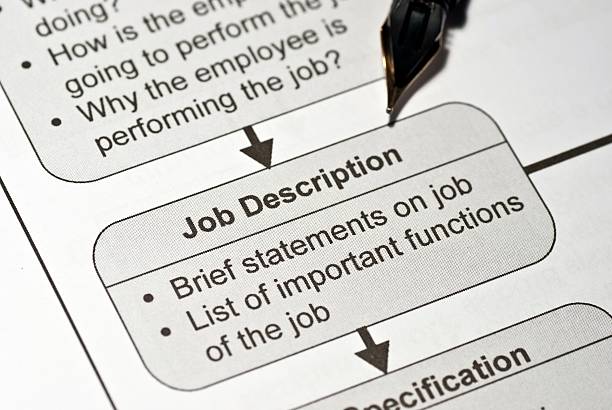Job Descriptions Are Outdated
Job Descriptions Are Outdated

MOSAiC Team
2 thg 8, 2024



Why Traditional Job Descriptions Are Outdated and How to Improve Them
In today's rapidly evolving job market, traditional job descriptions are proving to be increasingly inadequate. These static documents often fail to capture the dynamic nature of modern roles, leading to mismatches between employer expectations and candidate capabilities. Here are five compelling reasons why traditional job descriptions are outdated and practical steps to enhance them for better recruitment outcomes:
Reason 1: Lack of Flexibility
Traditional job descriptions tend to be rigid and fail to account for the evolving nature of roles within organizations. For example, a marketing role in a tech startup may initially focus on social media management but could evolve to include data analysis and customer insights as the company grows. Updating job descriptions regularly to reflect these changes not only ensures alignment with current organizational needs but also attracts candidates who are adaptable and proactive in their approach to work.
Reason 2: Focus on Duties Rather Than Outcomes
Many traditional job descriptions emphasize a list of duties and responsibilities without clearly outlining the expected outcomes or contributions from the role. Modern job descriptions should pivot towards highlighting the goals and measurable results that the candidate is expected to achieve. For instance, instead of simply listing tasks like "manage social media accounts," a forward-thinking job description might specify outcomes such as "increase engagement rates by 20% within the first six months."
Reason 3: Overemphasis on Qualifications
Traditional job descriptions often prioritize specific qualifications and credentials over skills and competencies. While qualifications may provide a baseline level of knowledge, skills such as problem-solving, creativity, and adaptability are equally crucial in today's dynamic workplace. For example, a software engineering job description that focuses solely on programming languages may overlook candidates who excel in problem-solving and innovative thinking, essential for troubleshooting complex issues and driving product development.
Reason 4: Generic Language
Many traditional job descriptions use generic language that fails to differentiate the role or convey the unique aspects of the organization's culture and values. To stand out in a competitive job market, employers should use specific and engaging language that resonates with potential candidates. For example, instead of stating "seeking a team player," a more effective job description might describe the company's collaborative environment and the importance of teamwork in achieving organizational goals.
Reason 5: Lack of Emphasis on Soft Skills
While technical skills are essential, soft skills such as communication, teamwork, and emotional intelligence are increasingly valued in today's workplace. Traditional job descriptions often overlook the importance of soft skills, focusing solely on technical competencies. Incorporating soft skills into job descriptions not only helps employers identify candidates who can collaborate effectively and communicate clearly but also promotes a diverse and inclusive work environment. For example, a sales job description that highlights the importance of empathy and relationship-building skills can attract candidates who excel in customer service and client management.
Transform Your Recruitment Approach with MOSAiC
At MOSAiC, we recognize the critical role that job descriptions play in attracting top talent. Our AI-driven platform enables organizations to create dynamic and compelling job descriptions that align with modern recruitment practices. With advanced filtering algorithms and smart analysis of candidate profiles, MOSAiC ensures that employers find the perfect fit for their roles, enhancing recruitment efficiency and effectiveness. Sign up for a free trial or schedule a consultation with our experts to experience the transformative power of MOSAiC in modernizing your recruitment strategy.
Why Traditional Job Descriptions Are Outdated and How to Improve Them
In today's rapidly evolving job market, traditional job descriptions are proving to be increasingly inadequate. These static documents often fail to capture the dynamic nature of modern roles, leading to mismatches between employer expectations and candidate capabilities. Here are five compelling reasons why traditional job descriptions are outdated and practical steps to enhance them for better recruitment outcomes:
Reason 1: Lack of Flexibility
Traditional job descriptions tend to be rigid and fail to account for the evolving nature of roles within organizations. For example, a marketing role in a tech startup may initially focus on social media management but could evolve to include data analysis and customer insights as the company grows. Updating job descriptions regularly to reflect these changes not only ensures alignment with current organizational needs but also attracts candidates who are adaptable and proactive in their approach to work.
Reason 2: Focus on Duties Rather Than Outcomes
Many traditional job descriptions emphasize a list of duties and responsibilities without clearly outlining the expected outcomes or contributions from the role. Modern job descriptions should pivot towards highlighting the goals and measurable results that the candidate is expected to achieve. For instance, instead of simply listing tasks like "manage social media accounts," a forward-thinking job description might specify outcomes such as "increase engagement rates by 20% within the first six months."
Reason 3: Overemphasis on Qualifications
Traditional job descriptions often prioritize specific qualifications and credentials over skills and competencies. While qualifications may provide a baseline level of knowledge, skills such as problem-solving, creativity, and adaptability are equally crucial in today's dynamic workplace. For example, a software engineering job description that focuses solely on programming languages may overlook candidates who excel in problem-solving and innovative thinking, essential for troubleshooting complex issues and driving product development.
Reason 4: Generic Language
Many traditional job descriptions use generic language that fails to differentiate the role or convey the unique aspects of the organization's culture and values. To stand out in a competitive job market, employers should use specific and engaging language that resonates with potential candidates. For example, instead of stating "seeking a team player," a more effective job description might describe the company's collaborative environment and the importance of teamwork in achieving organizational goals.
Reason 5: Lack of Emphasis on Soft Skills
While technical skills are essential, soft skills such as communication, teamwork, and emotional intelligence are increasingly valued in today's workplace. Traditional job descriptions often overlook the importance of soft skills, focusing solely on technical competencies. Incorporating soft skills into job descriptions not only helps employers identify candidates who can collaborate effectively and communicate clearly but also promotes a diverse and inclusive work environment. For example, a sales job description that highlights the importance of empathy and relationship-building skills can attract candidates who excel in customer service and client management.
Transform Your Recruitment Approach with MOSAiC
At MOSAiC, we recognize the critical role that job descriptions play in attracting top talent. Our AI-driven platform enables organizations to create dynamic and compelling job descriptions that align with modern recruitment practices. With advanced filtering algorithms and smart analysis of candidate profiles, MOSAiC ensures that employers find the perfect fit for their roles, enhancing recruitment efficiency and effectiveness. Sign up for a free trial or schedule a consultation with our experts to experience the transformative power of MOSAiC in modernizing your recruitment strategy.
Why Traditional Job Descriptions Are Outdated and How to Improve Them
In today's rapidly evolving job market, traditional job descriptions are proving to be increasingly inadequate. These static documents often fail to capture the dynamic nature of modern roles, leading to mismatches between employer expectations and candidate capabilities. Here are five compelling reasons why traditional job descriptions are outdated and practical steps to enhance them for better recruitment outcomes:
Reason 1: Lack of Flexibility
Traditional job descriptions tend to be rigid and fail to account for the evolving nature of roles within organizations. For example, a marketing role in a tech startup may initially focus on social media management but could evolve to include data analysis and customer insights as the company grows. Updating job descriptions regularly to reflect these changes not only ensures alignment with current organizational needs but also attracts candidates who are adaptable and proactive in their approach to work.
Reason 2: Focus on Duties Rather Than Outcomes
Many traditional job descriptions emphasize a list of duties and responsibilities without clearly outlining the expected outcomes or contributions from the role. Modern job descriptions should pivot towards highlighting the goals and measurable results that the candidate is expected to achieve. For instance, instead of simply listing tasks like "manage social media accounts," a forward-thinking job description might specify outcomes such as "increase engagement rates by 20% within the first six months."
Reason 3: Overemphasis on Qualifications
Traditional job descriptions often prioritize specific qualifications and credentials over skills and competencies. While qualifications may provide a baseline level of knowledge, skills such as problem-solving, creativity, and adaptability are equally crucial in today's dynamic workplace. For example, a software engineering job description that focuses solely on programming languages may overlook candidates who excel in problem-solving and innovative thinking, essential for troubleshooting complex issues and driving product development.
Reason 4: Generic Language
Many traditional job descriptions use generic language that fails to differentiate the role or convey the unique aspects of the organization's culture and values. To stand out in a competitive job market, employers should use specific and engaging language that resonates with potential candidates. For example, instead of stating "seeking a team player," a more effective job description might describe the company's collaborative environment and the importance of teamwork in achieving organizational goals.
Reason 5: Lack of Emphasis on Soft Skills
While technical skills are essential, soft skills such as communication, teamwork, and emotional intelligence are increasingly valued in today's workplace. Traditional job descriptions often overlook the importance of soft skills, focusing solely on technical competencies. Incorporating soft skills into job descriptions not only helps employers identify candidates who can collaborate effectively and communicate clearly but also promotes a diverse and inclusive work environment. For example, a sales job description that highlights the importance of empathy and relationship-building skills can attract candidates who excel in customer service and client management.
Transform Your Recruitment Approach with MOSAiC
At MOSAiC, we recognize the critical role that job descriptions play in attracting top talent. Our AI-driven platform enables organizations to create dynamic and compelling job descriptions that align with modern recruitment practices. With advanced filtering algorithms and smart analysis of candidate profiles, MOSAiC ensures that employers find the perfect fit for their roles, enhancing recruitment efficiency and effectiveness. Sign up for a free trial or schedule a consultation with our experts to experience the transformative power of MOSAiC in modernizing your recruitment strategy.
Recent posts



How AI is Revolutionizing the Recruitment Process
Artificial intelligence (AI) is transforming various industries, and recruitment is no exception. AI technology enhances efficiency, accuracy, and fairness in hiring, making it a game-changer for businesses of all sizes.
2 thg 8, 2024



Top 5 Challenges in Recruitment and How to Overcome Them
Recruitment is fraught with challenges that can hinder the hiring process. From time-consuming screenings to high costs, businesses face numerous obstacles. Here are the top five challenges in recruitment and how to overcome them.
2 thg 8, 2024
ReferReach
MOSAiC
Recruit smarter, not harder.
Find your top talent faster.
Recruit smarter, not harder.
Find your top talent faster.
Copyright © 2024 ReferReach Pte. Ltd.
All rights reserved.
Copyright © 2024 ReferReach Pte. Ltd.
All rights reserved.